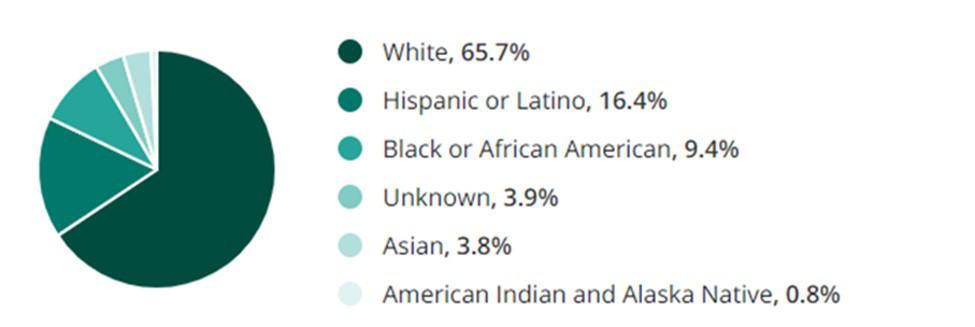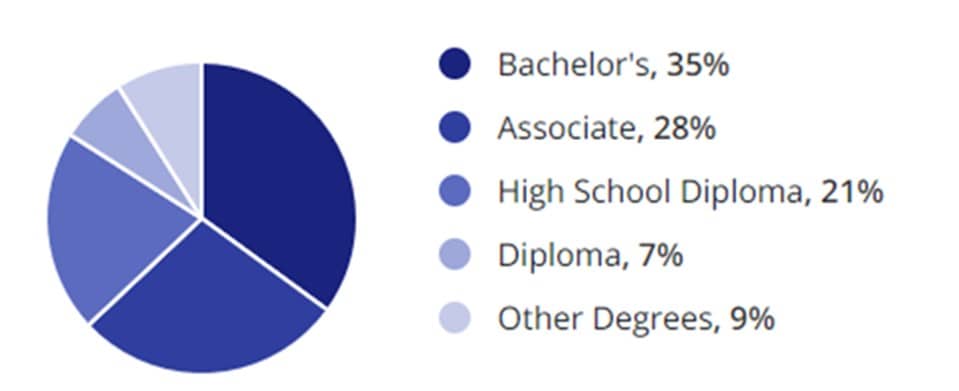Welcome to your ultimate guide on forging a successful career in the business sector. Whether you’re a college graduate stepping into the professional world or a seasoned professional aiming for growth, this guide provides essential insights and strategies for navigating business jobs’ versatile and dynamic landscape.
The business sector, a cornerstone of the global economy, offers various opportunities across various fields, including finance jobs, marketing jobs, operations jobs, and more. Diversity within this sector fosters a more prosperous, inclusive work environment and drives innovation and success by reflecting the multifaceted nature of the global market.
In this guide, we’ll explore everything from educational requirements and areas of expertise to demographics, salary trends, and the future outlook of business jobs. We aim to provide a roadmap that empowers you to make informed decisions about your career path and helps you align your ambitions with the right opportunities.
Ready to dive into the world of business careers? Let’s start on the path to finding your dream job in the vibrant and ever-evolving business sector.
Educational Requirements
A foundational step in securing business jobs is acquiring the proper education. Many roles in this sector start with a bachelor’s degree in business administration or a similar discipline. This degree covers business essentials like accounting, finance, marketing, and management, equipping graduates with entry-level business jobs.
A Master’s in Business Administration (MBA) is a common path for those seeking to specialize or advance to higher leadership roles. An MBA can provide a deeper understanding of business strategy and operations, further enhancing your qualifications.
Beyond degrees, certifications play a crucial role in a business career. They can show expertise in specific areas such as project management, human resources, or even specialized business technologies. Gaining certifications can make you stand out, especially for competitive roles like business intelligence analyst jobs or business analyst jobs near me.
A solid educational background paired with targeted certifications can be a strong foundation for business success.
Areas of Expertise
The world of business jobs is vast, with many pathways and specializations to explore. Here are some critical areas of expertise that business professionals can specialize in:
- Business Analytics: Focuses on analyzing data to make informed strategic decisions.
- Human Resource Management: Manages employee relations, hiring, and fostering a positive workplace culture.
- Marketing: Involves developing strategies to understand and engage customers effectively.
- Information Technology Management: Oversees a company’s technology infrastructure to support business operations.
- Operations Management: Ensures efficient and effective business processes, improving the company’s bottom line.
Each area requires a unique set of skills and knowledge. For example, pursuing a career in Business Analytics might necessitate strong data analysis skills and familiarity with specific software tools. On the other hand, human resource management requires excellent interpersonal and communication skills and a deep understanding of organizational behavior.
Choosing an area of expertise depends on your interests, strengths, and career goals. It’s also important to consider the market’s evolving needs, as new technologies and methodologies can shift the landscape of business operations and demand for specific specializations.
Demographics in the United States
Ethnicity/Race:
The landscape of business jobs in the U.S. showcases diversity, mirroring the multicultural essence of the market. The demographic distribution is broad, with White individuals making up 67.3%, Hispanic or Latino at 15.3%, Asian at 6.4%, and Black or African American at 6.2%, with the remaining percentages distributed among other races. This diversity is critical to bringing a wealth of perspectives and ideas, driving innovation and growth within the sector.

Gender:
Regarding gender distribution, the sector exhibits male dominance with 71.9%, while females constitute 28.1% of the workforce. Despite this disparity, efforts are in motion to balance the scales. Promoting gender diversity enriches the business landscape, fostering a more inclusive and well-rounded work environment.

Age:
The age range within business jobs is comprehensive, offering opportunities to young professionals and those with extensive experience. The average age hovers around 40 years, showcasing a blend of fresh perspectives and seasoned insights. Young professionals often introduce innovative ideas and adaptability, whereas their experienced counterparts contribute deep industry knowledge and strategic oversight.

Understanding the demographic landscape of the business sector is essential not just for employers in shaping their hiring practices but also for job seekers in recognizing the diverse opportunities and challenges within the field.
Salary Trends
Salaries in the business sector can vary greatly depending on the role, industry, geography, and level of professional experience. Generally, in the U.S., entry-level business roles offer salaries starting from around $50,000, providing a solid foundation for recent graduates or those new to the field. As professionals climb the ladder, seeking more specialized or higher leadership positions, salaries can surge to $150,000 and beyond. It’s important to note that roles in high demand, such as business intelligence analyst jobs, might offer higher starting salaries due to the specialized skills required.
Several factors can influence salary trends in the business sector:
- Location: Major metropolitan areas often offer higher salaries than rural areas due to the cost of living and competitive market.
- Industry: Technology and finance are known for having higher salary ranges due to the critical nature of business operations within these fields.
- Education and Certification: Higher educational qualifications and specialized certifications can significantly impact salary, as they demonstrate expertise and commitment to the field.
As the business landscape evolves with new technologies and global market trends, professionals who continuously enhance their skills and stay abreast of industry developments can expect their earning potential to grow. Keeping an eye on emerging skills and adjusting career paths can be a fruitful strategy for those looking to maximize their salary in the business sector.
Hiring Trends
The demand for business professionals remains steady, reflecting the integral role they play in the operational success of companies across industries. Specific trends, however, are shaping the hiring landscape:
- Technological Proficiency: With digital transformation affecting nearly all business areas, candidates proficient in new technologies are in high demand. Specializations in data analytics, cybersecurity, and digital marketing stand out.
- Soft Skills: As businesses value culture and team dynamics more, soft skills such as communication, leadership, and adaptability are becoming critical hiring criteria.
- Flexibility and Remote Work: The recent shift towards remote work has broadened the talent pool, allowing companies to prioritize skills and fit over location.
Furthermore, healthcare, technology, and e-commerce are seeing accelerated growth and a corresponding uptick in hiring needs. As traditional boundaries between disciplines blur, the demand for professionals navigating cross-functional roles—those with a mix of technical and soft skills—continues to rise.
Keeping current with these trends can guide job seekers in tailoring their applications and skill sets and employers in refining their recruitment strategies to attract top talent in a competitive marketplace.
Education Levels
In the business sector, the level of education a professional holds can greatly influence career trajectory and opportunities. While there is a vast range of roles within the business world, the typical educational benchmarks are:
- Bachelor’s Degree: Most entry-level business jobs require at least a bachelor’s degree in business administration or a related field. This degree is often viewed as the baseline for building a business career.
- Master’s Degree (MBA): For those aspiring to upper management or specialized roles, a Master of Business Administration (MBA) is highly regarded. An MBA not only deepens business acumen but also significantly expands networking opportunities.
- Certifications: Besides traditional degrees, certifications in project management, digital marketing, data analytics, and other specialized areas can distinguish candidates in the job market. These are especially valuable for mid-career professionals looking to pivot or advance.
It’s important to note that ongoing education and skill development play critical roles in the rapidly evolving business landscape. Keeping up with industry trends and technological advancements and acquiring new skills can be just as crucial as formal education. For those starting their career, entry-level positions may serve as a valuable learning ground for practical business applications, paving the way for future growth and advancement.

Skills in Demand
In today’s dynamic business environment, specific skills stand out, making candidates more attractive to employers. Here are some of the most sought-after skills in the business sector:
- Technical Skills: Understanding data analytics, financial modeling, and digital marketing tools can set you apart. Proficiency in specific software relevant to your field is also highly valued.
- Communication Skills: Effective communication, both written and verbal, is crucial. It helps negotiate, present ideas clearly, and work efficiently with teams.
- Problem-solving Abilities: Identifying problems, analyzing potential solutions, and implementing effective strategies are critical in the fast-paced business world.
- Leadership and Management Skills: The capability to inspire and lead teams, manage projects, and drive business objectives is essential for career progression.
- Adaptability: The business landscape is constantly evolving. Being adaptable and open to change is necessary for staying relevant and innovative.
While technical skills can often be learned through formal education or self-study, soft skills like leadership and communication are honed over time and with experience. Staying ahead in business requires a commitment to continuous learning and personal development, ensuring your skill set remains in demand.
Current & Future Business Jobs Outlook
The outlook for business jobs remains positive, reflecting the need for skilled professionals to steer companies through constantly changing market conditions. The U.S. Bureau of Labor Statistics projects a steady employment growth rate for business and financial occupations, suggesting a healthy and expanding job market ahead.
Key Trends Influencing the Business Job Market:
- Technological Advancements: Technologies such as artificial intelligence, big data, and blockchain are reshaping the business landscape, creating new opportunities and roles.
- Globalization: As businesses continue to operate globally, professionals with international experience and a grasp of global market dynamics are increasingly in demand.
- Remote Work: The shift towards remote and flexible work arrangements has opened up new possibilities for talent engagement, influencing hiring practices and job availability.
The future of business jobs looks promising for those prepared to adapt to technological changes with a keen understanding of global business strategies. Continuous learning and upskilling will be crucial in staying competitive and seizing new opportunities as they arise within the business sector.
FAQ’s
What degree do I need to start a business career?
A bachelor’s degree in business administration or a related field is typically needed for most entry-level business roles. For higher positions or specializations, a Master’s in Business Administration (MBA) can be beneficial.
Are certifications necessary in the business sector?
Yes, certifications can demonstrate expertise in specific areas, such as project management, digital marketing, or data analytics, and make you stand out to potential employers.
Can I switch to a business career in a different field?
Absolutely. Many professionals transition into business roles from other areas. Acquiring relevant certifications, gaining practical experience, and networking can facilitate this shift.
What role does technology play in business jobs?
Technology is revolutionizing the business sector, from how data is analyzed to how customers are engaged. Staying updated with technological advancements is crucial for success in this field.
Is remote work done every day in the business sector?
With the current trend toward digitalization and globalization, remote work has become more prevalent in the business sector, offering flexibility and a more comprehensive range of job opportunities.
How can I advance in my business career?
Continuous learning, earning relevant certifications, developing your leadership skills, and staying up-to-date with industry trends are critical strategies for advancing a business career.
Additional Resources
Consider delving into these additional resources to explore opportunities and insights into the business profession. They offer valuable information that can enhance your understanding and skills in the business world:
- The U.S. Bureau of Labor Statistics – Business and Financial Occupations page provides comprehensive data on employment, wages, and outlook for various business roles.
- The American Management Association offers a range of training programs and resources for developing management and leadership skills.
- The Project Management Institute is an excellent resource for those interested in project management, offering certifications and educational materials that are recognized globally.
Utilizing these resources can significantly impact your career trajectory, offering insights into the latest trends, skill development opportunities, and networking platforms. They can guide your continuous quest for personal and professional growth in the business sector.
Conclusion
The journey to a successful career in business is filled with endless possibilities and paths. You must follow these crucial steps to succeed in the dynamic business job market… Attain proper education, choose a specialization, keep up with hiring trends, and develop in-demand skills. Stay informed about the latest skill requirements and trends for success.
As you venture into or advance within the business sector, remember that continuous learning and adaptability are your best assets. Whether you’re seeking entry-level opportunities or aiming for leadership roles, the diversity of the business field offers something for everyone.
We encourage you to join Diversity Employment. You can easily upload your resume, access various diversity jobs, and connect with employers committed to diversity and inclusion. It’s a step towards finding a job and building a career in an environment that values and promotes diversity. Take that step today and be part of a community that’s driving positive change in the workplace.




